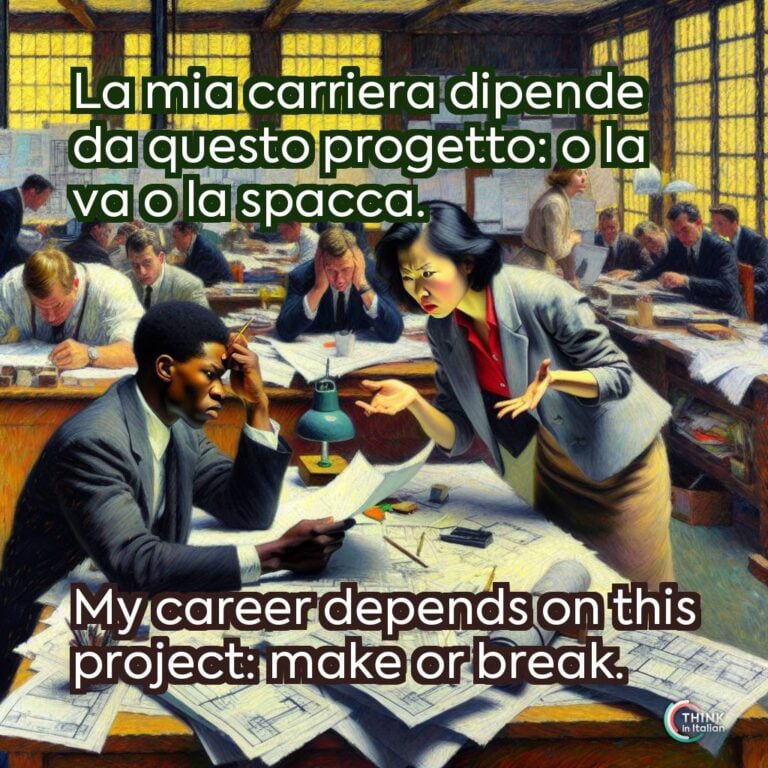What are Idioms
Idioms or idiomatic expressions are phrases that have a figurative meaning that is conventionally understood by the speakers of that language. This meaning is different from the literal meaning of the idiom’s individual elements.
For me, idioms are one of the most captivating elements of any language. These expressions capture cultural values, historical contexts, and shared human experiences.
They reflect unique ways in which people think and interact within their cultural framework, explaining why it is commonly shared that you behave differently when you speak a different language.
Italian idioms are particularly colorful and vivid, offering insight into the Italian way of life, Italian humor, and philosophy. Learning them will both enhance your vocabulary and deepen your understanding of the culture behind the language.
Learn more about Italian idioms!
Italian Idioms for Bold Decisions
“O la va o la Spacca”
The expression o la va o la spacca can be translated as “it’s do or die” or “make or break”. It captures the essence of taking a bold risk, knowing it could either succeed or fail dramatically.
This expression is used when you do not know the outcomes of a situation, but you are aware of the fact that you need decisive action. It conveys an all-or-nothing mindset.
There are several interpretations regarding the origins of this expression: one view suggests that la is not a definite article but a particle used to reinforce the subject, similar to the French structure “moi, je dis” (me, I say) to emphasize the subject.
Another explanation ties the phrase to the game of bocce (bowls) where the ball can either “go” (va) or “break” (spacca) the other balls.
“Prendere il Toro per le Corna”
Prendere il toro per le corna translates to “take the bull by the horns” and it suggests a proactive approach to challenges. It is used if you are facing a difficult situation with determination and courage rather than avoiding it.
The phrase probably comes from the literal act of grabbing a bull by its horns, symbolizing control over chaos.
“Mettere Tutto sul Piatto”
The expressions mettere tutto sul piatto literally means “put everything on the plate” and corresponds to the English “go all in”. It conveys the idea of risking everything for a chance to succeed, capturing the spirit of boldness and total commitment.
Just like its English counterpart, this expression probably derives from the world of gambling, specifically poker. In this context, the Italian word piatto does not refer to a literal plate but rather to the “pot”, the chips or money that players bet.
The piatto is the central pool where all bets are placed, and players compete to win it. Therefore, when a player decides to mettere tutto sul piatto they are “going all in”, betting all their remaining chips.
This action implies risking everything in the hope of winning the entire pot.
“Fare il Passo più Lungo Della Gamba”
Fare il passo più lungo della gamba translates to “to take a step longer than your leg”. This phrase is used as a warning against overreaching or taking on more than one can handle, therefore suggesting caution and prudence.
It describes situations where someone is acting beyond their capabilities. It conveys the idea of knowing one’s limits and being mindful of not overextending oneself. In English, a similar phrase is “biting off more than you can chew”.
Embrace Italian Idioms
Idioms are far more than simple phrases: they are keys that unlock the deeper meanings, cultural nuances, and shared experiences embedded within a language.
Italian idioms also allow you to better understand the history of the Italian language, with their rich imagery and historical depth, providing a window into the values, humor, and perspectives that define Italian culture.
Do not limit yourself to basic Italian words only, and start mastering idioms to expand vocabulary.








